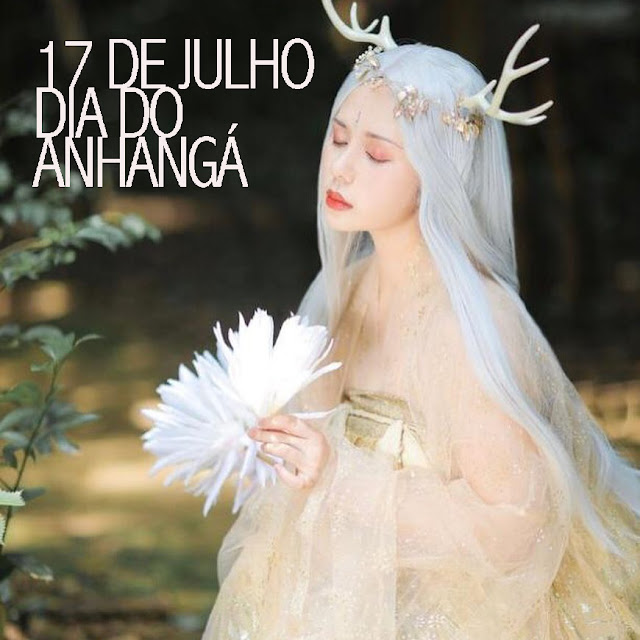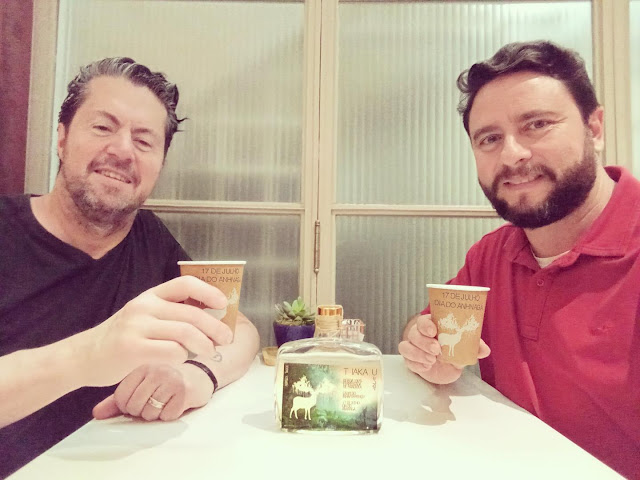 |
| Cauim Tiakau at Patio do Colegio, over 400 years old, an ancestral ritual that is being performed again |
On Sunday, the 16th, we celebrated Anahngá Day in the Anahngabau Valley in advance, since the 17th of July was a Monday. We toast to the protector of the forests with this incredible bottle of the commemorative edition of Cauim Tiakau, 100% cassava, authentic cauim from Inhapuambuçu.
“We've been doing this regularly since 2019, more than four hundred years after Cacique Tibiriçá and João Ramalho did it in the Anahngabau Valley,” said Luiz Pagano, who is Tibiriçá's 16th generation grandson and creator of the project and creator of the Japanese method.
 |
| Descending Genogram from Tibiriça to Luiz Pagano |
"EThis achievement is not mine, but a group of friends and brothers that I have for life, the dear and brilliant 作永 ひかる, who even without speaking a word of Portuguese helped me enormously to develop the Japanese method, based on production of sake using koji; Hildo Sena, that big brother that life brought me, creator of the enzymatic method, which not only evolves the process year-by-year, but also teaches his method to all his students at FATEC in Araçatuba ; Chefs Kalymarakaya and Fabio Eustaquio, who made the first dinner harmonized with CAUIM in Brazil, SENAC team from Campso do Jordão represented by Victor Pompeu, Kârasy Ko'ema, the great revivalist of Potiguara and Ancient Tupi culture, scholar of fermentations, language ancestor and bees at Aldeia TRAICAO in Paraíba, Mário Rubens .'., Chefs Thiago and Felipe Castanho, whose love for the Amazon and its people brought great inspiration in projects such as TEMBIU, Cassio Cunha, with whom I fulfill the old dream of working alongside , by stakeholders James Guimarães, Priscila Mallmann, Domingo Montanaro, Edu Guedes, along with a huge list of other important dream makers".
 |
| Celebration of the day of Anhangá - cosplay of the God represented with a white deer, of atrocious size and eyes the color of fire |
This event is yet another stage in the development, acculturation and commercialization of Cauim, a traditional Brazilian indigenous alcoholic beverage that is beginning to be produced using modern methods and sold to the general public. An excellent change of paradigms that, in addition to generating resources for villages and ethnic groups, can promote knowledge and appreciation of different Brazilian ancestral cultures
It is curious to realize that the drink, which existed long before the arrival of Portuguese and Spanish colonists in America, had not yet been successfully produced by means accepted by the industry and the market, as well as never having a marketing law in the country.
 |
| Cauim Tiakau close to ancient Jesuit ruins, 400 years later this ancestral ritual is being celebrated again. |
In April 2022, a public consultation was held for the revision of Decree No. 6,871, of 04/06/2009, which regulates Law No. 8,918, of July 14, 1994, on alcoholic beverages, with the publication of a new legal provision, which includes Cauim in the regulation of alcoholic beverages, a great opportunity arises to project Brazilian ancestral culture, inside and outside Brazil. The article presents a suggested business plan for the creation of Cauim production and marketing units, with an estimated payback of 18 months. This project brings hope for the preservation and appreciation of Brazil's rich cultural diversity.
The Cauim used in the toast is of the CAUIM DO INHAPUAMBUÇÚ type, a name that comes from the village of Tibiriçá, in reference to the rock formation that existed between the Anhangabau and Tamanduatei rivers, since Luiz Pagano's initial work was to rescue these ancient traditions of São Paulo de Piratininga, before Christian catechization.
The drink was developed at Fatec in Araçatuba by Hildo Sena's students, under his guidance in the classroom. It is slightly frizzy, with the characteristic flavor of the manioc flour biscuit, which catches on the tongue with balanced acidity. "It is a culture that is in its first steps, the way of serving, the glasses and the ritual of consumption are still open. Everything is possible as long as we guarantee respect for indigenous ancestral traditions, and that everything is named in ancient Tupi, language spoken by Tibiriça and Potira.
Cauim is in the acculturation phase, it is not yet available for sale.
T’ereîkokatu*” - ‘may you be well! - health in old tupi
Prohibited content for under 18s 🔞


No comments:
Post a Comment